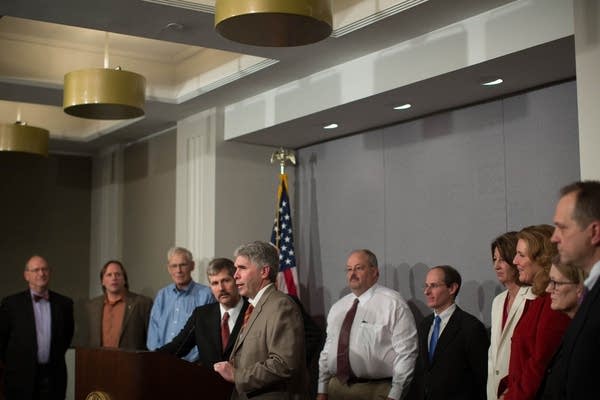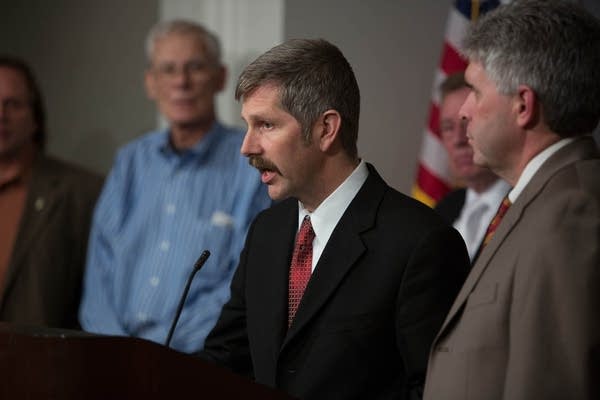With bill in hand, legislators squeezed for time to establish health insurance exchange

As the new legislative session gets underway this week, DFL and Republican lawmakers wasted no time in unveiling a bill to carry out a key part of the federal health care overhaul in Minnesota: establishing a state health insurance exchange.
The exchange will provide an online gateway for up to a million Minnesotans to comparison shop for health insurance and enroll in Medicaid beginning Oct. 1. Lawmakers have about 10 weeks to pass a bill and get it on the governor's desk.
Gov. Mark Dayton's administration has made great strides in creating a Minnesota insurance exchange: securing more than $70 million in federal funds, mobilizing task forces, signing contracts to build the exchange's technical backbone.
Create a More Connected Minnesota
MPR News is your trusted resource for the news you need. With your support, MPR News brings accessible, courageous journalism and authentic conversation to everyone - free of paywalls and barriers. Your gift makes a difference.

But there's been one glaring exception — getting a GOP-controlled Legislature to authorize the exchange the administration has been building. With Democrats now controlling not only the governor's office but also the Legislature, that should be more likely. And even some Republicans are willing to help.
Rep. Jim Abeler, R- Anoka, is no fan of the federal health care law but says as a pragmatist he will try to make the bill as good as it can be.
"This has an opportunity to be one of the best things that Minnesota has happen to it or one of the worst things, depending on how well it's done," Abeler said. "It has a chance to help people with lesser costs or actually increase costs, if it's done badly.
"It's going to cost to cost us some money on the front end and so we need to spend that money wisely and make sure we get our value out of it."

Sen. Tony Lourey, a DFLer from Kerrick and chair of the key Senate Health and Human Services Finance Division, said the bill is a starting point.
"We're going to have a long and involved discussion. These are important changes in a large market segment of the Minnesota economy," Lourey said. "We're going to work very, very hard to include all voices and make sure that we do the very best job for Minnesotans through that process."
The exchange bill does attempt to provide some preliminary answers to critical questions that have swirled for more than a year. Questions such as: who'll be in charge of the exchange, how will the state fund it, and who will help consumers and small businesses use the online marketplace?
"If a company meets the certification requirements to sell in the exchange, every company that meets the stated requirements should be able to sell in the exchange."
The legislation calls for a seven-member board to run the exchange, which the bill calls a Minnesota Insurance Marketplace. The board would include representatives of consumers; small business; experts in health care finance, public health programs and the uninsured.
The board would have the power to decide which plans would be able to sell on the exchange. That rankles Minnesota's health insurers. Julie Brunner of the Minnesota Council of Health Plans said insurers don't think a board should be able to limit which plans sell on the exchange as long as those plans meet required benchmarks.
"If a company meets the certification requirements to sell in the exchange, every company that meets the stated requirements should be able to sell in the exchange," Brunner said.
Funding the exchange long-term is another thorny topic. Under this bill, the exchange would withhold 3.5 percent of all premiums sold on the exchange prior to 2015. That withholding becomes optional in subsequent years.
Last month, the feds proposed a similar 3.5 percent "user fee" on premiums sold through on the federal version of an exchange, is the alternative for states that don't operate their own exchanges.
The legislation doesn't settle one of the toughest issues in exchange planning — how to deploy and how much to pay insurance brokers and so-called navigators and assisters who will help consumers and small businesses use the exchange.
Similar exchange legislation failed in previous sessions because Republicans, averse to President Barack Obama's health care law, were in control. They hoped the U.S. Supreme Court would strike down the federal law altogether or Mitt Romney would win the White House. Neither event occurred. But that means state lawmakers now have no time to spare.
Federal and state deadlines require Dayton to sign an exchange bill no later than March 31. And because state legislators are off the last week in March for Passover and Easter, that's barely 10 weeks to get through 14 committees.

